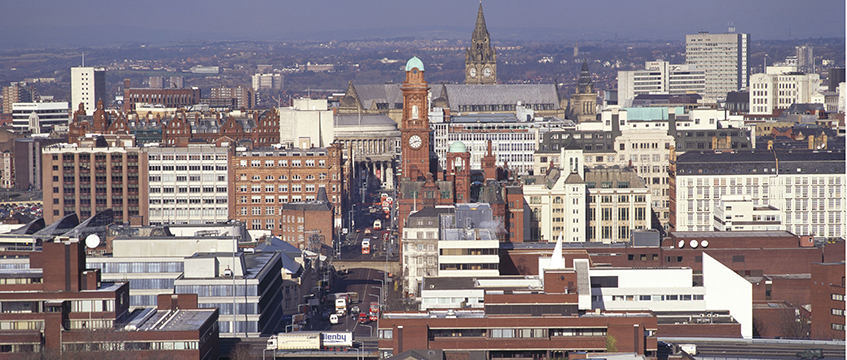As Amazon inches closer to securing an office in Manchester, its move presents WeWork with an opportunity to team up with the tech giant and establish its third site in the city.
Amazon is closing in on an office in the city centre with Hermes Investment Management’s 91,000 sq ft Hanover House the frontrunner for the company’s circa 70,000 sq ft requirement.
In its recent expansions across the world – including in Dublin and in Haifa, Israel – Amazon has used a range of flexible office providers to give them short-term space, managed by the providers, before considering a long-term option.
That strategy is used on a case-by-case basis, particularly in new markets where the medium and long-term need for business is less clear.
A source close to Amazon said: “This is the modus operandi for Amazon. They’re looking for one particular operator in one particular market.”
Meanwhile, WeWork recently opened its second office in Manchester with 40,000 sq ft at One St Peter’s Square. It has been long-rumoured to be looking for a third site in the city and discussions are understood to have included the Northern Quarter.
Manchester: growth through placemaking
The flexible office company has been increasingly dependent on partnering with large corporates. Despite doubling revenue to $866m (£652.6m) last year, the flexible office provider still reported a loss of $933m and is growing its array of services to plug that gap – most recently with the acquisition of UK fit out company LTB.
Through its Powered by We business WeWork designs office space for large corporates and manages it for them. Its existing customers include Standard Chartered, which partnered with WeWork to build an innovation lab in Hong Kong. In New York last April, IBM took all of WeWork’s 70,000 sq ft at 88 University Place in a deal where the flexible office provider agreed to design and manage its space.
WeWork’s enterprise clients – companies with more than 1,000 staff – accounted for close to a third of the operator’s revenue according to figures it released last September, and the number of large clients it worked with nearly doubled between June 2016 and 2017.
What could a potential deal look like?
WeWork has been long been in discussions with Amazon over collaborating at Hanover House, but a potential deal could still take a number of forms.
One option is the model WeWork has followed with other large corporates, with Amazon taking the lease on only the space it needs and the flexible office company designing and managing it.
Another option would involve Amazon leasing the whole building and subletting part of it to WeWork. That option would give the office provider a foothold in an area of Manchester it does not yet reach with its St Peter’s Square and No. 1 Spinningfields offices, an area that is undergoing redevelopment and has a growing tech community.
Manchester approves glut of residential schemes
For Amazon, it would give it a revenue stream to cover some of the costs of the lease and allow it some flexibility to expand into the WeWork space at a later date or look to sublease further space to WeWork if its plans are less successful.
The same source close to Amazon said: “If you punch in a couple of floors into an asset, which you rent to, say, WeWork, then suddenly you get that flexibility within an asset that you can take on or you can amortise and create revenue to pay for the asset itself.
“You can attract talent into the facility, which could be a useful recruiting ground or for customers or third parties and create those richer kinds of environments.”
The bigger picture
These scenarios are part of a growing trend in flexible workspace. Other providers like Regus and The Office Group have also developed enterprise offerings, and according to the Instant Group the number of enquiries for more than 20 desks in the UK has increased by 45% since 2016.
John Duckworth, managing director at Instant Group, said demand from large corporates for flexible space is particularly strong in places like Birmingham and Manchester: “Larger corporates are looking for alternative enterprise solutions because they don’t want to sign leases there, but they want entry to these booming local markets.
“Flex demand in the regions has been strong and corporates are just following in the direction of the SMEs and scale-ups.”
He warned that the industry needs to “wake up” to these new dynamics, adding: “Companies are thinking outside the box. They’re not constraining themselves to traditional landlord-tenant relationships anymore. They’re starting to call the shots about what they need as a customer from their property.”
WeWork and Amazon
WeWork and Amazon have forged partners several times in the last few years. In 2017 those deals included:
■ 2 Herald Square in New York’s Midtown: Amazon agreed to take all of WeWork’s desks across 122,000 sq ft in the 11-storey building
■ The Bentall Centre in Vancouver, Canada: Amazon took 76,000 sq ft from WeWork last October ahead of the development of its permanent office
■ 31 St James Ave in Boston, Massachusetts: Amazon leased temporary space in the WeWork office while hunting for a permanent office in the city
To send feedback, e-mail karl.tomusk@egi.co.uk or tweet @ktomusk or @estatesgazette











